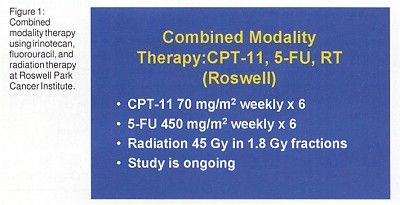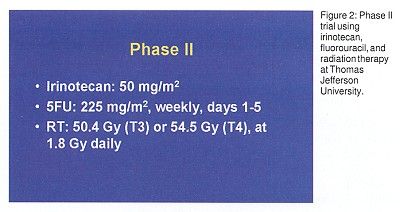Combined Modality Therapy Has Enhanced Activity in Locally Advanced Rectal Cancer
PHILADELPHIA-A phase II study in patients with locally advanced rectal cancer showed that the combination of irinotecan (Camptosar), fluorouracil (5-FU), and concomitant radiation given preoperatively is well tolerated and appears to have enhanced activity. Reporting the results, Edith Peterson Mitchell, MD, noted that ongoing phase II studies will determine the pathologic response rates and patterns of disease recurrence. Dr. Mitchell is clinical professor of medicine, Division of Medical Oncology, Kimmel Cancer Center of Thomas Jefferson University, Philadelphia.
PHILADELPHIAA phase II study in patients with locally advanced rectal cancer showed that the combination of irinotecan (Camptosar), fluorouracil (5-FU), and concomitant radiation given preoperatively is well tolerated and appears to have enhanced activity. Reporting the results, Edith Peterson Mitchell, MD, noted that ongoing phase II studies will determine the pathologic response rates and patterns of disease recurrence. Dr. Mitchell is clinical professor of medicine, Division of Medical Oncology, Kimmel Cancer Center of Thomas Jefferson University, Philadelphia.
To emphasize the need for better treatment, Dr. Mitchell cited the risk of recurrence following surgical resection. "Local recurrence alone or in combination with distant recurrence occurs in 25% to 50% of patients," she said. "The recurrence rate is 5% to 10% for stage I patients, 25% to 30% for stage II patients, and over 50% for stage III patients, with local recurrence as a major factor."
Downstaging with Chemoradiation
Improved diagnostic methods have enhanced staging procedures, allowing for more accurate determination of advanced disease and better selection of patients who might potentially benefit from more aggressive therapies. "Chemoradiation can downstage many patients with locally advanced or unresectable disease," Dr. Mitchell said. "We also now know that the results of mesorectal excision are better than those reported by standard surgical resection followed by radiotherapy with or without chemotherapy." Although radiation reduces locoregional recurrence rates, used alone it has little effect on disease-free or overall survival in rectal cancer.
"5-FU-based chemotherapy combined with pelvic irradiation is superior to either modality in reducing locoregional failures and improving disease-free and overall survival of patients with stage II or III rectal carcinoma," Dr. Mitchell said. "However, the most effective combination of drugs, optimal mode of administration, and best sequence of radiation and chemotherapy have not been determined."
Preoperative Chemoradiation
Preoperative chemoradiation may surpass postoperative administration in part because of the biological, physical, functional, and clinical advantages associated with preoperative radiation therapy. Combining chemotherapy with radiation increases resectability and pathologic complete responses compared to radiation alone, and preoperative chemoradiation is also associated with less toxicity.
"Preoperative chemoradiation also decreases tumor seeding while the numbers of oxygenated cells during surgery are increased, eliminates postsurgical small bowel fixation in the pelvis, and is more effective in reducing local failure," Dr. Mitchell said. ‘‘There is generally diminished acute toxicity because there is less small bowel in the radiation port before resection and postsurgical small bowel fixation."
Dr. Mitchell advised that special care should be taken when giving preoperative chemoradiotherapy to individuals who have had previous pelvic surgery such as hysterectomy.
Irinotecan as Radiosensitizer
Irinotecan used in part as a radiosensitizer is being studied in combination with 5-FU and radiation in an ongoing study at Roswell Park Cancer Institute (Figure 1). Early results of this study have been encouraging," Dr. Mitchell said.

Dr. Mitchell and colleagues at Jefferson conducted a phase I study to determine the maximum tolerated dose (MTD) of weekly irinotecan combined with 5-FU and concomitant RT given preoperatively. Patients had primary or recurrent stage T3/T4 rectal adenocarcinoma previously untreated with chemotherapy or radiation. This regimen was then used in a phase II trial (Figure 2).

"We wait 8 to 10 weeks after chemoradiation to perform surgery to allow the tissues to heal adequately. We have also observed continued shrinkage of tumor after completion of the radiation, and the delay permits completion of this process," Dr. Mitchell said. The major toxicity was catheter-related infection or thrombus. Other toxicities included diarrhea, neutropenia, and stomatitis.
Downsizing of Tumor
Every patient in this trial had a downsizing of tumor in response to therapy. Among the 46 patients, there were 12 complete responses, 5 patients with minimal residual disease, and 17 patients with a clinical response plus minimal residual disease.
The study includes analysis of tumor markers including p53 p21, thymidylate synthase, and microsatellite instability (MSI). "MSI has the best predictive ability. All patients with high MSI had pathologic complete responses to treatment," Dr. Mitchell said.
Since most toxicities were catheter related, the investigators would like to avoid infusions and so are substituting capecitabine (Xeloda) for 5-FU infusions in future trials.